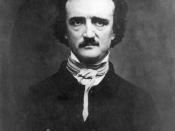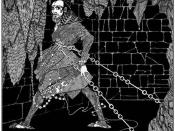EVIL
The Grandmother in Flannery O'Connor's "A Goodman is Hard to Find", fears death. She hopes to convince the Misfit to spare her by begging and telling him that he is a good man and should find Jesus. While the Misfit, who is a convicted murderer, seems to regret murdering the grandmother. In Edgar Allan Poe's "The Cask of Amontillado", Fortunato the fool also fears his impending death at the hand of the evil Montresor who had borne "The thousand injuries of Fortunato" (Poe 206). But Fortunato had finally gone too far by insulting him. Montresor is unwavering in his pursuit to get revenge on Fortunato. His evil is powered by his pride and his time honoured family motto.
The grandmother fears her impending death and is not prepared for it. She believes that she can delay her death by pleading to the Misfit, but her counter-arguments to his complaints are trivial and sound like all purpose memorized responses.
She tells The Misfit that "You could be honest too if you'd only try...Think how wonderful it would be to settle down and live a comfortable life and not have to think about somebody chasing you all the time." (O'Connor 202). When she hears that he went to prison, she says "That's when you should have started to pray" (O'Connor 203). She goes on encouraging him to believe in God and to pray, but it becomes clear that she is doing so only in hopes of saving her own life. The grandmother humbled herself and lost the pretenses of her shallow beliefs when confronted with death. If she had been confronted with death every day of her life she would have been a better person.
The Misfit is mentally disturbed and justifies his lifestyle by saying that "crime doesn't matter... sooner...


